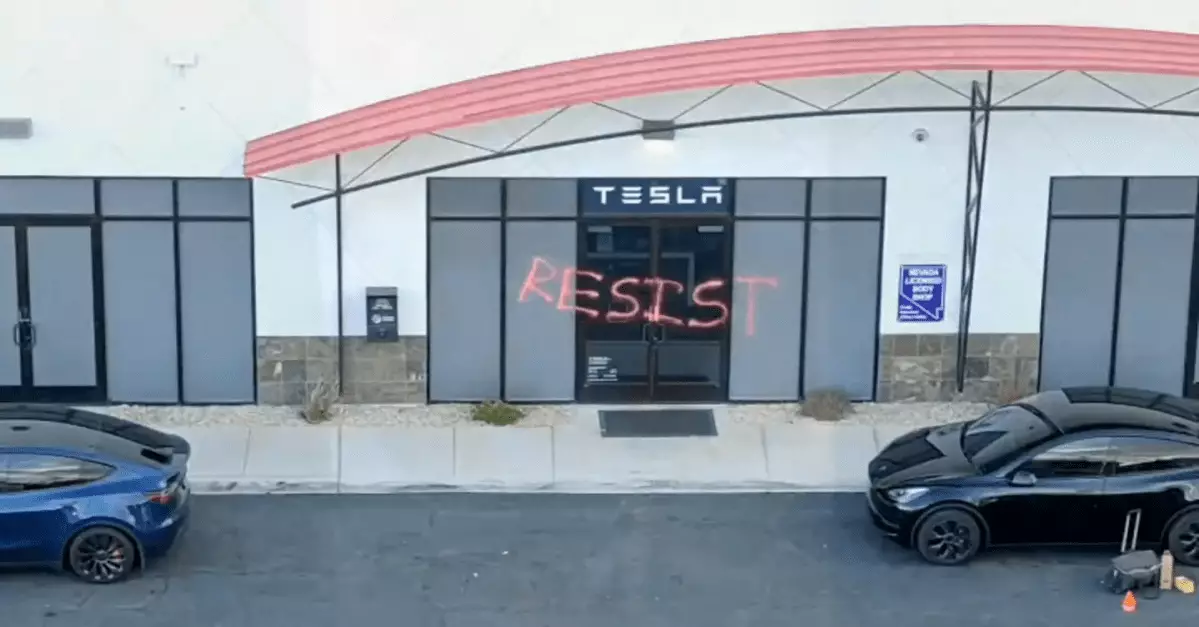Recent events surrounding Tesla’s vehicles illustrate an alarming trend: acts of vandalism aimed at the electric car company are escalating to a level that authorities are considering classifying them as domestic terrorism. The situation became particularly intense with two separate incidents in Las Vegas and Kansas City that not only damaged property but also instigated fear and uncertainty in the communities involved. With this growing hostility towards Tesla, one must reflect on the societal implications—are we witnessing the birth of a new and troubling form of aggressiveness against innovative technology?
On Tuesday morning, a shocking act of vandalism took place at a Tesla collision center in Las Vegas. Footage and eyewitness accounts suggest that an individual donned in black launched Molotov cocktails and discharged bullets into several vehicles, concluding the chaos with the ominous word “resist” scrawled onto Tesla’s property. The prompt action of local fire services, which successfully extinguished the flames before they could escalate, indicates the seriousness of the threat posed to Tesla’s infrastructure and its models. This is more than mere vandalism; it is an attack on a symbol of modern advancements in technology and sustainability.
The FBI’s Involvement
Given the severity of the situation, the Federal Bureau of Investigation has taken an active role in the investigation, now treating it as a terrorism case. Special Agent Spencer Evans cautioned potential perpetrators against following in the suspect’s footsteps, suggesting that such violent protests carry severe repercussions. The decision to escalate the matter to this level raises significant questions about the nature of dissent in today’s society. Are we witnessing a dangerous polarization regarding clean energy and technological progress? Moreover, does this reflect a broader narrative against the disruption that innovation often brings?
Elon Musk, Tesla’s outspoken CEO, did not shy away from labeling these attacks as terrorism in social media posts. His response reflects an underlying truth: Tesla has become a lightning rod for controversy amid debates surrounding electric vehicles and their role in reducing carbon footprints. However, the intensity of the backlash raises concerns about how society views change and challenges. Do these acts reflect unresolved anxieties about the future, or are they the result of a fear of the unknown technology disrupting traditional automotive practices?
A Call to Examine Underlying Causes
Both incidents seem to highlight an attitude of aggression and animosity towards a company that is at the forefront of environmental innovation. This begs the question: what drives such hostility? The narrative around Tesla, much like that surrounding other emerging technologies, is fraught with division. Critics argue that the transition to electric vehicles is rapid and disruptive, which may evoke feelings of helplessness among those who feel left behind. However, it is crucial to address these sentiments constructively rather than resorting to destructive acts.
As Tesla continues to play a vital role in the automotive revolution, society must engage in open dialogues about the challenges posed by such rapid advancements. Understanding and addressing the root causes of this anti-Tesla sentiment can pave the way for a more inclusive approach towards the future of mobility and technology. Moving forward, we must carefully consider how we can foster a society that champions innovation without resorting to hostility or violence.


Leave a Reply